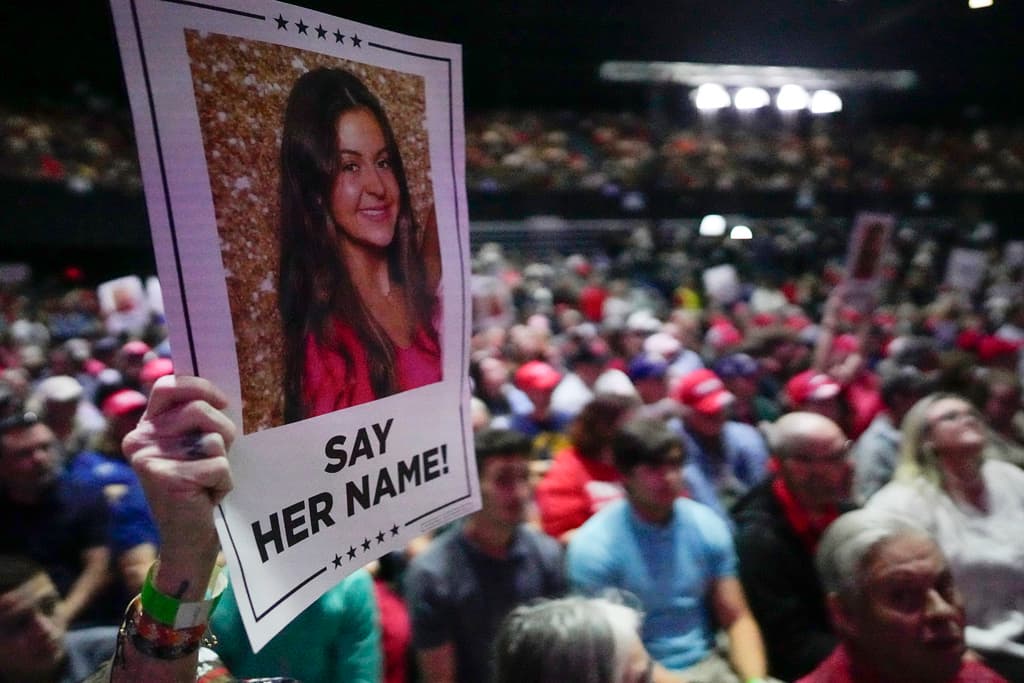Trial To Begin Friday for Migrant Accused of Murdering Laken Riley, in Case That Ignited National Firestorm
The defendant’s decision this week to waive his right to a jury could be because ‘the facts are so outrageous that they don’t want the jury to rush to a judgment,’ one observer tells the Sun.

A trial is set to begin Friday for Jose Antonio Ibarra, the migrant charged with murdering a 22-year-old college nursing student, Laken Riley, in one of the nation’s most high-profile criminal cases that also sparked a national immigration policy debate.
The defendant’s decision this week to waive his constitutional right to a jury trial, instead opting for a bench trial overseen by a singular judge, could be because the facts are so “gruesome” that it’s safer to avoid a potentially-emotional jury, a senior legal fellow at the Heritage Foundation and former homicide prosecutor, Charles Stimson, tells The New York Sun.
The defendant, Jose Antonio Ibarra, is a Venezuelan citizen who entered America illegally in 2022. A grand jury indicted him on ten counts in connection with Riley’s death earlier this year, including malice murder, felony murder, and aggravated assault, to which he has pleaded not guilty.
Riley, who had been studying nursing at Augusta University’s Athens campus, was found dead in a wooded area of the nearby University of Georgia on February 22 after she didn’t return from a run. The indictment alleges that Mr. Ibarra murdered her by inflicting “blunt force trauma to her head and by asphyxiating her” as well as disfiguring her “by striking her head multiple times with a rock.”
Riley’s death promptly became a flashpoint in national pushback against the Biden administration’s border policies, and President Trump referred to Riley’s death repeatedly on the campaign trail. Federal legislation introduced in her name, the Laken Riley Act, passed the House earlier this year, and the upcoming trial could put that legislation back in the spotlight, with the Senate now under Republican control.
Regardless of congressional action, President Trump’s picks for top immigration positions are already sending a “very clear signal that we’re going to get back in the business of enforcing the law, especially as it relates to immigration,” Mr. Stimson says.
“Whether the Congress decides it’s worth their bandwidth to do something like that is totally up to the Congress and the administration,” he says. “But we don’t need another law to make illegal immigration illegal.”
When it comes to Mr. Ibarra’s case, Judge H. Patrick Haggard, of the Athens-Clarke County Superior Court, will oversee the trial — and the lack of jury will likely speed up the verdict. On Tuesday, Mr. Ibarra’s defense team, with prosecutors in agreement, had requested the bench trial.
“There’s really two reasons why you waive your constitutional right to a jury,” Mr. Stimson says. “The first reason is because the facts are so gruesome or pull on the heartstrings that a jury — who are 12 human beings who aren’t usually lawyers — could be swayed emotionally to find somebody guilty even if you maintain your innocence.”
Allowing a judge to decide on “the facts of the law alone” can help take emotions “out of the equation,” he adds.
The second reason people waive their rights to a jury, Mr. Stimson says, is to do a “slow plea,” which is when the “facts are so overwhelmingly powerful, but the defendant wants his day in court” so the defense team convinces the defendant to proceed with a single judge rather than a jury.
Bench trials are much speedier than jury trials, as time isn’t wasted on jury selection, objections, and jury deliberations.
“There’s a hung jury. There’s no hung judge,” he says. “So it’s going to be guilty or not guilty, and so you take the emotional, gruesome nature of the facts, sort of off the table.”
He says while it’s impossible to know the reasons a defense team recommends a bench or jury trial in a given case, that his guess is that “the facts are so outrageous that they don’t want the jury to rush to a judgment, and they think that he can be acquitted if they have a dispassionate judge rendering a verdict on the facts.”
There are sometimes reasons for defendants to opt for a jury, though. In another high-profile criminal case — O.J. Simpson’s murder trial in the mid-1990s — the verdict would have been “guilty, period,” Mr. Stimson says, if it had been in front of a judge rather than a jury.
“But that jury was swayed by Johnnie Cochran and the defense team,” he says. “So there are reasons to pick a jury trial when you think you can pull the wool over the eyes of the jury or get somebody to hang it up, because all it takes is one to hang it up.”
The lack of a jury will change the presentation of the trial, he says, as both sides will likely give shorter opening statements as they’re not trying to sway a jury. The defense will also likely spend their time attempting to prove that the government hasn’t met
“its burden of proving the case beyond a reasonable doubt,” Mr. Stimson adds.
The Sun reached out to the prosecutor and Mr. Ibarra’s defense attorney for comment.

